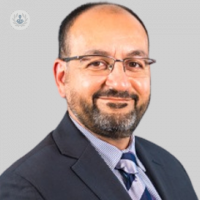What are targeted anti-cancer drugs?
Escrito por:Top Doctors recently spoke to highly revered consultant clinical oncologist, Dr Omar Din, who, here in our latest medical article, describes what exactly targeted anticancer drugs are, and reveals when targeted drug therapy is recommended.

What is a targeted anti-cancer drug?
Targeted anti-cancer drugs work against specific ways cancer cells use to grow and survive. They are used in the treatment of several cancers, particularly those that have spread.
There are many different types of targeted drugs. These are grouped together depending on how they work. These groups include antibody therapy (monoclonal antibodies), cancer growth blockers, drugs that block cancer blood vessel growth, and drugs that stop damaged cancer cells repairing themselves. A specific type of targeted antibody therapy is immunotherapy, which encourages the immune system to attack cancer cells.
How do targeted anticancer drugs compare to other cancer treatments?
Targeted anti-cancer drugs are different to chemotherapy in both the way they work and their side-effects. Targeted drugs usually focus on blocking, for example, a specific growth signal, leading to cell death.
Chemotherapy is more general in killing cells that are actively dividing. Given most cancer cells divide more rapidly, chemotherapy has a greater impact on these than normal cells. The main difference in side effects is that chemotherapy usually dampens down the immune system (increasing the risk of infection), whereas most targeted therapies have different (but equally important) side-effects.
When is targeted drug therapy recommended?
Targeted anti-cancer drug therapy is usually recommended in specific cancers with a specific target involved in cancer cell growth or survival. It can also depend on whether or not the cancer has spread, or if other treatments have already been received.
These drugs have usually been thoroughly evaluated in specific cancers, showing a clear benefit in clinical trials. Some cancers need a specific test to see if they carry the right target, but this is not always necessary.
How successful is targeted drug therapy?
Clinical trials have shown significant benefits from the use of targeted drugs in certain cancers. They have the potential to reduce the risk of recurrence after radical curative treatment. In addition, for certain cancers that have spread, they have been shown to improve quality of life and delay progression.
What are some examples of novel targeted anticancer drug treatments?
Some examples of targeted drugs are shown below:
- Monoclonal antibodies.
- Drugs that block the growth of cancers.
- Drugs that block cancer blood vessel growth.
- Hormone therapy.
- PARP inhibitors.
Dr Omar Din is a highly respected and experienced consultant clinical oncologist who specialises in cancer diagnosis and treatment. Consult with him today via his Top Doctors profile.



